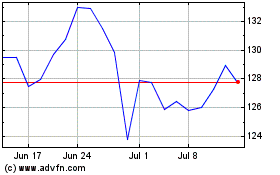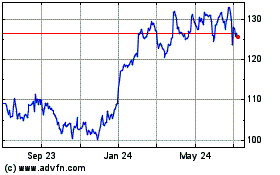Global sales topping $3.8 billion in 2017 for Keytruda spur
efforts to develop more uses
By Peter Loftus
This article is being republished as part of our daily
reproduction of WSJ.com articles that also appeared in the U.S.
print edition of The Wall Street Journal (April 16, 2018).
RAHWAY, N.J. -- Merck & Co. is making one of the biggest
bets on a single drug in the pharmaceutical industry, a move that
is risky but that could, if successful, pay off for the company and
a broad array of cancer patients.
Merck's Keytruda, a new type of cancer drug that harnesses
patients' immune systems to fight tumors, is already marketed to
treat lung, skin, bladder and other cancers. Global sales soared to
more than $3.8 billion in 2017 -- about 9% of Merck's total revenue
-- fueled by a monthly U.S. price tag of $13,500 and studies
showing it prolongs patient survival in some cancers.
Doctors view the development of Keytruda and other
immunotherapies as a big advance that has already helped some
patients live longer. Merck sees more potential uses and sales. The
company and outside researchers are running more than 700 clinical
trials for Keytruda in more than 30 cancer types, according to the
National Institutes of Health -- an effort commanding more than
half of Merck's budget for all clinical drug studies, according to
R&D chief Roger Perlmutter.
Merck says it has scrapped work in other diseases to put
resources into Keytruda, marking a big cultural change for the
company, according to people who have worked there.
"I said to everyone, 'Whatever other projects you're working on,
you can stop now, because we're going to be doing this, and we're
going to put a lot of muscle behind this,'" Dr. Perlmutter said. He
said he based the decision on early clinical data showing that
Keytruda shrank some tumors effectively, and on the knowledge that
rival Bristol-Myers Squibb Co. had already released positive study
results of its rival drug, Opdivo.
Dr. Perlmutter moved scientists and money into Keytruda and shed
projects he considered less promising, he said, such as an
experimental drug for psoriasis that Merck licensed in 2014 to Sun
Pharmaceutical Industries Inc.
"Before Keytruda, Merck's R&D strategy was to bring as many
drugs to market as they could," said Bernard Munos, a
pharmaceutical R&D consultant who previously worked at Eli
Lilly & Co.
Some analysts and investors worry Merck is becoming too reliant
on Keytruda, a factor they say is behind the 8.7% slide in the
company's stock price over the past year, versus a 1.3% decline in
the S&P Pharmaceuticals Select Industry index.
Credit Suisse analysts predict Keytruda annual global sales will
surpass $10 billion in 2022, making up 22% of Merck's total
revenue. Sales of some of Merck's other best-selling drugs,
including Remicade and Vytorin, have declined amid generic
competition, and more drugs are likely to face such competition in
coming years.
"Unfortunately for Merck, the rest of the business is not that
strong," said Credit Suisse analyst Vamil Divan.
Dr. Perlmutter acknowledges the risk of investing so much in
Keytruda but says Merck continues to conduct R&D in other
areas. The company has more than 40 other drugs in clinical
testing, including potential treatments for infectious diseases and
diabetes.
"This is a very easy business to make mistakes in, and you can
always make investments that don't yield major contributions to
human health," he said in an interview at a Merck site in Rahway,
N.J., where oncology R&D is based. "I do feel that we have a
responsibility with Keytruda to ensure that we fully demonstrate
what this drug can do."
Few brand-name drugs have been subjected to as many studies as
Keytruda. More than 600 trials are listed for Keytruda's closest
competitor, Bristol-Myers's Opdivo, and more than 500 for AbbVie
Inc.'s Humira anti-inflammatory drug, according to
ClinicalTrials.gov, a database run by the National Institutes of
Health.
Dr. Perlmutter, who previously ran R&D at Amgen Inc.,
identified Keytruda as a priority soon after Merck Chief Executive
Kenneth Frazier hired him to lead R&D in 2013.
To help oversee the Keytruda trials, Merck boosted its in-house
U.S. oncology leadership to about 100 specialists, from about 20 in
2013, said Roy Baynes, head of global clinical development. About
27,000 patients are enrolled in the Merck-sponsored Keytruda
studies, with targeted enrollment of 62,000, a spokeswoman
said.
One closely watched study could help signal whether Merck's
strategy is sound. The company is expected to report Monday
detailed results of a trial of Keytruda combined with chemotherapy
to treat advanced lung cancer. Merck said in January the
combination improved patient survival but it didn't disclose
details.
Merck also has provided the drug for free to outside researchers
running their own trials. One study by researchers at Johns Hopkins
University in Baltimore showed Keytruda was effective in patients
with a variety of cancer types whose tumors share a rare genetic
defect.
Keytruda trial results haven't been uniformly positive. The drug
failed to prolong survival in some studies, including one in
gastric-cancer patients that Merck disclosed in December. And last
year the FDA ordered Merck to stop two Keytruda trials after more
blood-cancer patients receiving the drug died than those on other
treatments.
"I question our strategy all the time," Dr. Perlmutter said. But
on balance, he said, "we have really good data."
Write to Peter Loftus at peter.loftus@wsj.com
(END) Dow Jones Newswires
April 16, 2018 02:47 ET (06:47 GMT)
Copyright (c) 2018 Dow Jones & Company, Inc.
Merck (NYSE:MRK)
Historical Stock Chart
From Mar 2024 to Apr 2024

Merck (NYSE:MRK)
Historical Stock Chart
From Apr 2023 to Apr 2024
